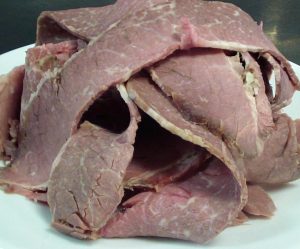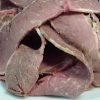Corned beef is a salt-cured meat that has long held a place in cultural cuisines across the globe. The term “corned” refers to the coarse grains of salt, once called “corns,” used in the curing process. Corned beef first became popular in Ireland in the 17th century when British landowners began salting and exporting beef, primarily to feed armies and navies. Ironically, although it is now associated with Irish-American cuisine, traditional Irish citizens rarely consumed corned beef due to its cost and export focus.
The History and Background of Corned Beef
Corned beef is a salt-cured meat that has long held a place in cultural cuisines across the globe. The term “corned” refers to the coarse grains of salt—once called “corns,” used in the curing process. Corned beef first became popular in Ireland in the 17th century when British landowners began salting and exporting beef, primarily to feed armies and navies. Ironically, although it is now associated with Irish-American cuisine, traditional Irish citizens rarely consumed corned beef due to its cost and export focus.
In America, corned beef became widely recognized thanks to Jewish immigrant communities in New York, who adapted brisket using pickling spices and salt. Over time, this delicious, briny meat became a staple dish in delicatessens. Corned beef gained further popularity during wartime, especially World Wars I and II, when canned versions were shipped globally to troops.
Today, corned beef is most famously associated with St. Patrick’s Day celebrations, often paired with cabbage and potatoes. Its rich, savory flavor and historical roots make it a favorite comfort food for many. While modern methods may use nitrates and refrigeration, the original curing techniques still inspire many homemade versions.
From ancient preservation to contemporary cuisine, corned beef has earned a lasting legacy. It’s more than just a holiday meal; it’s a flavorful bridge between cultures and centuries, a preserved piece of culinary history that continues to nourish traditions worldwide.
The Nutritional Information on Corned Beef
Corned beef is a flavorful, salty meat that appeals to many, especially around holidays or in comfort food recipes. However, understanding its nutritional content is essential for making informed dietary choices. A typical serving of corned beef (about 3 ounces) contains approximately 210–250 calories, depending on the fat content. It’s high in protein—providing around 15 grams per serving—but also contains considerable fat and sodium.
One of the primary concerns with corned beef is its sodium content. Traditional recipes use salt brine and curing agents, leading to over 800 milligrams of sodium per serving. For individuals watching their blood pressure or sodium intake, this can be a drawback. Additionally, corned beef can be high in saturated fat, which may contribute to cholesterol issues if eaten in large quantities.
On the positive side, corned beef offers a good dose of iron, zinc, and B vitamins, especially B12, which supports red blood cell formation and neurological health. Feedback from fans of corned beef often highlights its savory, satisfying taste and versatility, from hash to sandwiches.
However, health-conscious individuals may seek lower-sodium versions or prepare it from scratch to control ingredients. Homemade corned beef recipes allow for adjustments—reducing sugar, controlling fat, and skipping preservatives. Overall, while corned beef is delicious, moderation and mindful preparation are key to enjoying it as part of a balanced diet.
Popular Dishes Made with Corned Beef
Corned beef is a versatile meat with a deep, savory flavor that lends itself to a variety of dishes. One of the most iconic ways to enjoy corned beef is in a Reuben sandwich—a hearty stack of corned beef, Swiss cheese, sauerkraut, and Russian dressing, grilled between slices of rye bread. This deli favorite has become a staple in American cuisine.
Another classic dish is corned beef hash, which combines diced corned beef with potatoes, onions, and sometimes peppers, all pan-fried until crispy. It’s a go-to comfort food, especially for breakfast, often served with a fried egg on top. For those seeking Irish-American traditions, corned beef and cabbage is a timeless pairing, typically simmered together with carrots and potatoes in the same pot, creating a flavorful, one-pot meal.
Corned beef also makes a great addition to pasta bakes, stuffed peppers, or even pizza toppings for those who like a salty twist on their pie. In some cultures, such as the Philippines, canned corned beef is stir-fried with garlic and onions and served with rice and eggs, creating a beloved dish known as “Corned Beef Silog.”
No matter the preparation, corned beef remains a comfort food classic. Its ability to absorb spices and blend with a wide range of ingredients makes it a valuable item in kitchens worldwide. Whether for breakfast, lunch, or dinner, corned beef offers both flavor and familiarity.
Healthy Alternatives to Corned Beef
Corned beef is beloved for its rich taste and savory texture, but its high sodium and fat content can make it a less-than-ideal choice for health-conscious eaters. Fortunately, several alternatives can offer similar satisfaction with fewer nutritional drawbacks.
One option is lean brisket prepared without curing agents or excessive salt. By slow-cooking lean brisket with herbs, onions, and broth, you retain tenderness and flavor while eliminating the need for a salt-heavy brine. For plant-based eaters, tempeh or jackfruit marinated in spices can mimic the texture and spice of traditional corned beef in sandwiches and hash recipes.
Turkey pastrami or roast turkey breast also makes a good substitute for corned beef in sandwiches, offering protein with less fat and sodium. When it comes to corned beef hash, sweet potatoes and chickpeas can be combined with lean meat or tofu for a lighter version of the dish. Even roasted beets paired with spices and vinegar can evoke the color and tang of corned beef without the meat.
Homemade corned beef alternatives also allow for more control. By making it yourself, you can reduce sugars, eliminate nitrates, and use fresh herbs like bay leaf, caraway, and cloves to boost flavor naturally.
Ultimately, while corned beef has its culinary charm, exploring healthier versions can add variety to your meals without sacrificing taste. With a bit of creativity, you can honor the tradition while nourishing your body.
House Cured Corned Beef
Ingredients
- 2 cups salt
- 10 lbs brisket beef, raw
- 16 ea juniper berries
- 1/3 cup white sugar
- 5 oz brown sugar
- 1 oz molasses
- 2 tsp dry mustard seed
- 8 each cloves
- 4 each bay leaves
- 1/4 tsp ginger dried
- 3 quarts water
- 3 quarts ice or water
- 1 tsp caraway seeds
Instructions
- Bring 3 quarts of water to a boil
- Reduce to a simmer. Thoroughly stir in all ingredients, granulated ingredients should dissolve. Do not add brisket
- Turn off heat, double the volume with ice or cold water. You want to reduce the temperature of your brine to below 40 degrees before brining your brisket.
- In a narrow pot large narrow pot, place brisket, pour cold brine over brisket. Cover pot
- Brine brisket for 7 – 10 days minimum
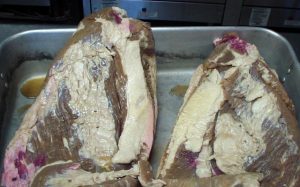
Cook Corned Beef
- Using a pot that holds 1 gallon per lb. of brisket, for this 10lbs use a pot that holds 10 gallons of water with brisket in it, fill with brisket in the pot and bring to a boil, reduce to a simmer
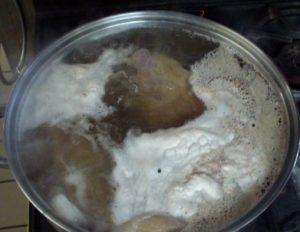
- Simmer 2 -3 hours until internal temperature reaches 185 – 195 degrees f.
- If serving as a corned beef dinner follow instructions for Corned Beef and Cabbage recipe
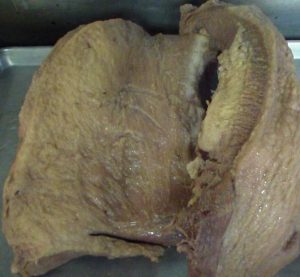
- If using for sliced sandwich meat, cool slice across the grain
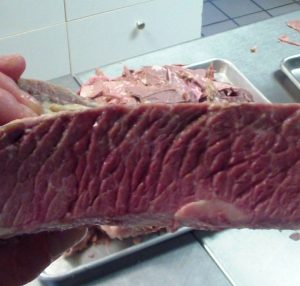
- If making a reuben grill sandwich follow instructions for Reuben
